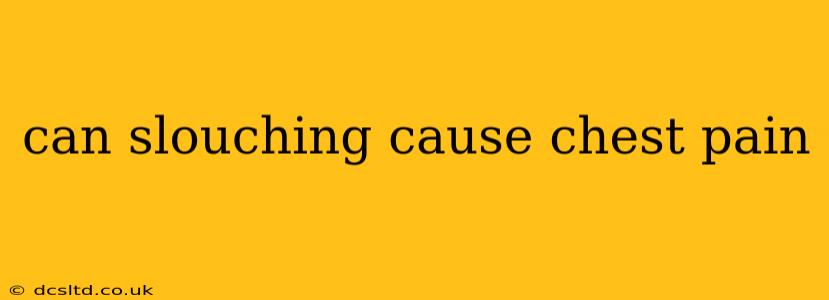Slouching, that seemingly harmless habit of poor posture, can surprisingly contribute to chest pain. While not always the direct cause, slouching can exacerbate existing conditions and create new problems that manifest as discomfort in your chest. This article delves into the connection between slouching and chest pain, exploring the underlying mechanisms and offering solutions for improved posture and pain relief.
How Does Slouching Affect My Chest?
Slouching significantly impacts your body's alignment. When you slouch, your shoulders round forward, your chest collapses, and your spine curves abnormally. This posture can:
- Compress your lungs: Reduced lung capacity can lead to shortness of breath, which can be misinterpreted as chest pain. The feeling of tightness or pressure in your chest can mimic other more serious conditions.
- Strain your muscles: The muscles in your chest, back, and neck work overtime to compensate for poor posture. This constant strain can lead to muscle tension, spasms, and pain that radiates to your chest.
- Affect your ribs and cartilage: The constant pressure on your ribs and the cartilage connecting them can cause pain and stiffness in your chest.
- Irritate nerves: Poor posture can compress nerves, leading to referred pain that feels like chest pain. This is particularly true of nerves in the neck and upper back.
Can Slouching Cause Heart Problems?
While slouching itself doesn't directly cause heart problems, the associated muscle strain and restricted breathing can indirectly affect your cardiovascular system. The reduced lung capacity can put more strain on your heart to pump blood, potentially leading to discomfort. However, it's crucial to understand that chest pain should never be taken lightly. If you experience chest pain, especially if accompanied by shortness of breath, dizziness, or sweating, seek immediate medical attention. Slouching is unlikely to be the cause of a serious cardiac event.
What Other Conditions Can Mimic Chest Pain Related to Slouching?
Several conditions can present with chest pain that might be mistaken for problems stemming solely from posture. These include:
- Costochondritis: Inflammation of the cartilage that connects your ribs to your breastbone. This can be aggravated by poor posture.
- Muscle strains: Strained muscles in the chest, back, or neck can cause referred pain felt in the chest.
- Anxiety: Anxiety can manifest as chest pain, often accompanied by shortness of breath and rapid heartbeat.
How Can I Improve My Posture to Relieve Chest Pain?
Addressing poor posture is crucial for managing chest pain related to slouching. Here are some steps you can take:
- Be mindful of your posture: Throughout the day, actively check your posture. Sit and stand tall, keeping your shoulders back and relaxed.
- Strengthen your core: Strong core muscles provide support for your spine and improve posture. Exercises like planks, bridges, and crunches are beneficial.
- Stretch regularly: Stretches targeting your chest, back, and shoulders can help alleviate muscle tension and improve flexibility.
- Use ergonomic tools: Ensure your workspace is ergonomically sound. Use a supportive chair, position your computer screen at eye level, and take regular breaks to move around.
- Consider professional help: A physical therapist or chiropractor can provide personalized guidance and exercises to improve your posture and address any underlying musculoskeletal issues.
When Should I See a Doctor About Chest Pain?
Never ignore chest pain. While slouching can contribute to chest discomfort, it's vital to rule out more serious conditions. Seek immediate medical attention if you experience:
- Chest pain accompanied by shortness of breath, dizziness, or sweating
- Sudden, sharp chest pain
- Chest pain that worsens with activity
- Persistent chest pain that doesn't improve with rest or over-the-counter pain relievers
This information is for general knowledge and does not constitute medical advice. Always consult a healthcare professional for diagnosis and treatment of any medical condition.
